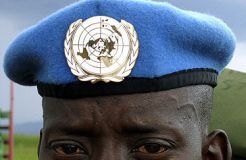Darfur needs bigger, stronger peacekeeping force – aid groups
June 9, 2006 (LONDON) — Aid workers in Darfur were closely watching efforts to get U.N. peacekeepers into the troubled region of western Sudan, saying they need a bigger, stronger force to protect themselves and the millions who depend on them.

Khartoum has been reluctant, but “has not shut the door to such a transition,” Ted Chaiban, chief of UNICEF operations in Sudan, said in a telephone interview Thursday.
“The planning is definitely on the way,” said Chaiban, who oversees programs in Darfur that include getting clean water to 2.3 million people and ensuring 380,000 children can go to school.
James Morris, executive director of the World Food Program, said that four truck drivers for his agency were killed in Darfur last year, and that robberies occurred regularly. The WFP is feeding close to 3 million people in Darfur.
“Security is at the heart of the future of the area,” Morris said, adding he hoped the way would soon be opened for U.N. peacekeepers.
Security deteriorated significantly immediately after the main rebel movement and the government signed a peace treaty May 5, as various warring parties fought to gain ground in anticipation of being forced to cease fire.
Much of that fighting has subsided, but there is no guarantee the lull will last, and criminal violence continues.
“You need a force on the ground that can consolidate the peace process,” said UNICEF’s Chaiban. “It’s not going to consolidate itself.”
In addition, the conflict is spreading, with the U.N. reporting increased cross-border attacks on Darfur refugees in neighboring Chad and on Chadians in the region. Securing the border may be an additional task for any new peacekeeping force.
The 7,000 African Union troops in Darfur are willing but unable to keep the peace in an area the size of Western Europe, said Rudy Von Bernuth, who heads Save the Children USA’s emergency response operations. Von Bernuth said his group’s 1,000 employees serving some 100,000 needy in western Darfur are “severely” hampered by lack of security. The main challenge is moving from place to place safely in a region where bandits have taken advantage of the war’s chaos.
AU peacekeepers are “essentially operating as if they were blindfolded,” Von Bernuth said. “They don’t have enough people. They don’t have enough equipment. And they don’t have the intelligence systems that any modern military force would need to do this job.”
Even if Khartoum were to agree to U.N. peacekeepers today, it would take months before they arrived. In the meantime, the AU and the U.N. were planning to beef up the AU force, by as much as 3,000 troops, with helicopters and other equipment supplied by Western powers.
Von Bernuth was concerned that the major Western powers, while endorsing the idea of U.N. peacekeepers for Darfur, had not committed themselves to sending troops. The U.S., stretched by deployments in Iraq and Afghanistan, was expected to lend only logistical support to a Darfur peace force.
Leslie Lefkow, a Human Rights Watch Researcher who closely follows Darfur developments, said the Sudanese government may persist in resisting U.N. peacekeepers, and the U.N. has pledged not to intervene without the government’s approval.
Khartoum accepted U.N. peacekeepers in southern Sudan after an unrelated, two-decade-old war ended with a January peace agreement. But Lefkow said Sudan’s Muslim northern elite may have found it easier to relinquish control over the largely Christian or animist south, while Darfur is predominantly Muslim.
The government has portrayed the U.N. peacekeeping proposal as a bid by the West to take over Sudan, rhetoric that could inflame anti-U.N. sentiment in Darfur and elsewhere in the country.
A U.N. force would not be a panacea, Lefkow acknowledged.
“But it would hopefully provide a major deterrent force on the ground,” she said.
(ST/AP)
